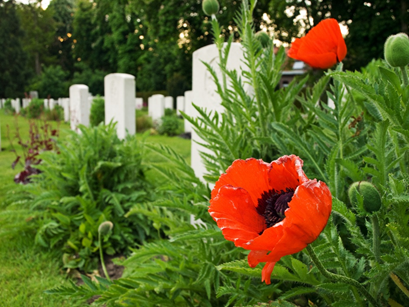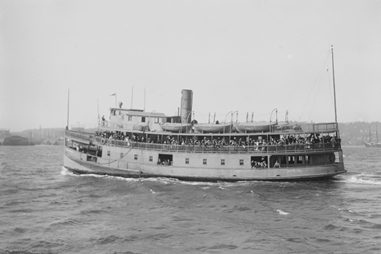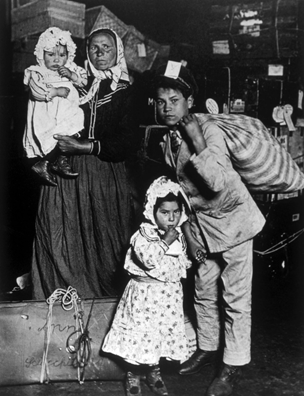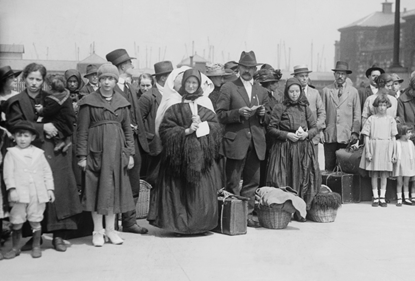4.4: Writing Skills- The Narrative Paragraph
- Page ID
- 104408
What Is a Narrative Paragraph?
A paragraph in which you tell a story or relate an event. A narrative paragraph answers the question “What happened?” In this paragraph, keen cyclist Ken Lackman describes a visit to Belgium that changed his life.

In 1990, I was cycling from Bruges to some small town near the French border, on my way to the Belgian National Beer Festival. After a couple of hours, I started to worry that I was on the wrong road. I stopped and opened my map. A voice called out to me and I saw an old man standing in front of his house to my right. He came over, helped me and then bored me with some war stories that I was not interested in hearing. I said I had to leave and continued on. A short time later I stopped again because I was completely bewildered by the number and size of the cemeteries I was seeing in farmers' fields. I had no idea that I was in Flanders Fields. I reached the beer festival, stayed only for a short time and turned around to go to Ypres and the World War I museum. I had seen it on my ride and I figured it would help me understand how and why so many people had died in that small area. I ended up spending a few days in Ypres so I could explore the trench museum, the spot where John McCrae had written the poem,* and countless cemeteries. I returned to Canada and read everything I could find about the First World War. A year or so later, I went back to school to study history with a goal of becoming a history teacher. That trip changed my life. And I will always regret that I had a chance to talk to someone who had lived through the hell and, through my own ignorance, passed it up.
*The poem Ken refers to is In Flanders Fields. Written about World War I, it is one of Canada’s best-known poems.
60,000 Canadians were killed in World War I, which took place from 1914 to 1918.
What Makes a Good Narrative Paragraph?
- It has unity; it is all about the same incident.
- The meaning is clear; everything is presented in the order in which it occurs. There is a clear beginning and a clear ending.
The paragraph answers all the questions the reader might have about the event. These are as follows:
- Who was the story about?
- What happened?
- When did the story take place?
- Where did the story take place?
- Why was the event important to the writer?
- The writer uses language to show exactly when parts of the story happen. Notice that Ken starts off with In 1990 … He then uses expressions like After a couple of hours, A short time later, and A year or so later.
Steps for Writing the Narrative Paragraph
1. As you know, your writing should begin with some brainstorming. Think about your topic—what do you want to say about it? Use a mind map to start to collect some ideas.
2. Make a plan for your paragraph. Make sure you are presenting your ideas in the order in which they occurred.
3. Write your first draft. Don’t worry about getting everything perfect at this stage; just get your ideas on paper. Make sure you answer the Wh− questions: Who, What, When, Where, and Why.
4. Revise your draft. Follow the ARMS checklist you learned in Unit 1 (Add, Remove, Move, and Substitute). Make sure that you have used time expressions to make it clear when the events took place.
5. Edit your paragraph and write your final draft. Now that your ideas are in place, you can focus on grammar, spelling, word choice, and punctuation.
You Try It!
Read the following story.
New Beginnings
By Sophie Milburn
The boat rocks back and forth as the icy waves crash on the upper deck. Part of me feels relieved that we aren’t up there being covered by the water, but being down here feels like being in a floating grave, dark and cramped, filled with people waiting for death. There’s a huge surge, and the boat lifts off the water and crashes back down again.
I pull my children in tighter. I can feel all five of them shaking with fear and cold. As we sit in our corner against our row of beds, I think back to the month we’ve had as a family. Leaving our little town in Italy, having all our possessions taken, inspected, and disinfected as if we were some sort of disease, and getting on this boat for the fifteen-day journey to America. It feels like a blur, leaving everything behind for this new life. I just hope it’s worth it.
“Momma, when are we going to see Papa?”
“Soon tesoro, soon. I promise.” I try and reassure them.
My heart is breaking for my children. They haven’t seen their father in two years, as he’s already in America making money so we can have a good life when we arrive. The hardest thing I’ve ever had to do was say goodbye to him, but I had to be strong for my kids.

The boat rocks violently to one side. This could be it. I just hope that if we die out here, they’ll find this journal and give it to Pietro, so he knows what happened. He is the best husband I could have ever asked for. I know that when we get there everything will have been worth it—the time, effort, our exhaustion—because our family will be reunited. Small tears start rolling down my cheek. I hastily wipe them away. I have to be strong; I’m all that my children have. If I fall apart now, they will have no hope.
Another surge in the boat. I clench my fists harder, my nails digging into the palms of my hands, a cold sweat engulfing them.
“Bambinis, get into the bed. Let’s try and get some rest.” I lift my children up and place them in the two lower bunks so they won’t slide off and hurt themselves in the night. “Just think, this could be our last night on here. Tomorrow might be the start of our new life.” I tuck them in and climb into my own bed alone.
I don’t want to give them false hope, but I’m sure we’re getting close. We must be; we’ve been on this boat for fourteen days now if I’ve counted correctly. We must be getting close. I hate to admit that I’m scared, but I am. I get up and climb into bed with my two youngest daughters. Sleep comes faster than I thought, my eyelids feeling heavier and heavier by the second. I say a quick prayer that tomorrow will be a new day, a better day, and I will finally see my husband again. With that thought, I quickly drift off to sleep.

I wake up with a jerk, the boat’s horn blasting every few seconds. As I rub the sleep out of my tired eyes more and more of the people that are crammed into steerage start to wake up.
“What’s that noise?” my bunk neighbor asks me. I shrug and go to the window. The window is grimy and nearly impossible to see through. I can just barely make out something coming closer and closer to us … the dock! We are finally here!
It’s a mad panic to get off the boat. People are sick and tired of being crammed into the steerage of the vessel for fifteen days. They push and shove their way through the crowd in anticipation of seeing America for the first time. You can feel the desperation surging through us all. I grab my kids’ hands tightly, making sure they are all with me, and start to push through just like everyone else. I don’t want to be left behind. Not after all this.
All I can think about is seeing my husband again. Two years is a long time, and I can’t wait to have my family reunited again. My youngest was only a few months old when he left us, but all she’s talked about on the voyage is seeing her dad again.
“Steerage over here, first class over there!” A guard is shouting and dividing up lines, the first-class passengers going into a smaller, somehow nicer line, while we cram together in a mob. We gather our luggage, a small bag each, and hustle into the lines. We’re ushered into a massive room with huge windows and a massive American flag. I see a sign that says we’re in the Great Hall. There are rows and rows of benches filled with people, all waiting their turn.
We finally reach the front of the line and are brought into a large room. We drop our bags off in a cart to be taken to another room, simply labelled “Inspection.”
“Name?” An inspection officer asks me.
“Rosa Sicurella.”
“Occupation?”
“I once worked in a restaurant, but not since I’ve had my children,” I explain, motioning to my five kids standing behind me.
“Marital status?”
“Married, but my husband is already here. My children and I are meeting him.”
“Ok, and how much money are you carrying on you, Rosa?” He says this sympathetically, as if he knows I have nothing. I was warned about this, how the government wants us to be able to support ourselves, so I came prepared.
“About eighteen dollars,” I reply uncertainly, unsure if I’ve done the conversion right. The guard looks shocked, but pleased. I let a sigh of relief escape my lips.
“Perfect, just a few more questions and you’ll be sent through to the next area.”
Eventually we are finished and sent through for medical examining. We’ve made it through halfway, but this section is what scares me the most. My friends back in Italy have told me from experience or from other friends that Ellis Island is referred to as “Heartbreak Island” because of the hundreds of thousands of immigrants that get turned away due to illness, criminal record, and insanity. I’m not ill, I don’t have a criminal record, and I’m pretty certain I’m not insane, so I like my chances.
A nurse wearing a white suit and gloves comes up to us and starts looking at our clothes, picking through our hair and swabbing inside our mouths. When she’s finished with me she does the same for all my kids. I squeeze their hands in reassurance, and let the nurse carry on with her job. I see someone ahead of me getting the letter X written with chalk on the back of their clothes … I don’t know what it’s for, but I have a suspicion it isn’t a good thing. The guard wearing the white suit waves us forward. He doesn’t reach for the chalk, which I hope is a good thing. I nod my head at him and keep walking forward, my stomach still in knots. I’m just praying that this is the final station and we are almost through.

We are ushered through the next set of doors, and into a big room, which is full of guards stamping documents. This must be it! I walk up to the first guard I see, he stamps a piece of paper, hands it back to me, and smiles. “Welcome to America
, Rosa.”I smile back at him, usher my kids forward, and we walk out the next set of doors where we retrieve our bags and walk to the next room. I wonder how many rooms there are on this island; this process feels never-ending.
I go outside, and I see lots of people standing there, some crying, hugging, waiting, and watching. I figure these are relatives of people entering the country, but I don’t see Pietro anywhere. That doesn’t bother me; he’s probably at home waiting for us. I keep walking.
The first view I have of New York is lots of water and our boat at the dock. I want to take everything in, the sharp smell of the fuel from the boat, the seagulls flying around, the view of the Manhattan skyline in the distance. It’s so close I feel like I can reach out and touch it.
“Look kids, there it is, there’s our new home. We’re going to see your Papa real soon.” I smile for the first time in days, knowing our future is in reach.
…
Another boat. I feel like I shouldn’t complain, but I’m so sick of boats. But this is only a short ride, only about twenty minutes to Manhattan. When we reach the dock, the muddled smell of urine, smoke, and sewage hits me. There are horns blasting, bells ringing, people shouting—this might be the most noise I’ve ever experienced in my life. I try to find our way to the address I have written on a piece of paper, getting lost, being surrounded by people I don’t know. After a lot of walking and asking strangers for directions, we finally find the small apartment on the Lower East Side that my husband promised was going to be our new home. I walk up to the front door, and knock three times.
A woman opens the door … That’s odd. Maybe she is the landlady or the housekeeper. We’ve never had a housekeeper before. Pietro must be making good money.
“Hello?” This young, blonde American woman smiles down at me from the landing, her blue eyes giving off a welcoming warmth. The smell of bread baking inside hits me, and I’m instantly reminded of my hometown in Italy. It also reminds me of how hungry we all are. My mouth starts to water, and I have to blink a couple times to bring me back to where I am. I’m confused. This is the address he gave me … am I lost? No, I’m positive this is right. I had directions.
“Ciao, I’m Rosa.”
“Hello Rosa, I’m Helen.” She extends a hand to greet me. I take it and smile. I think I’m going to like America. New Yorkers seem like nice people.
“What can I do for you?” she asks.
“Is this 148 Mott Street?”
“Yes, why? Did someone give you this address?”
“Yes actually, I’m looking for Pietro Sicurella. Is he here?”
“He’s at work right now, but he should be home soon.”
“I’m sorry Helen, I don’t mean to be rude, but who are you exactly?”
“I’m his wife. Who are you?”
Now, working in a group or on your own, brainstorm how the story might end. Write the final paragraph of the story. Use the space below.
________________________________________________________________________
________________________________________________________________________
________________________________________________________________________
________________________________________________________________________
________________________________________________________________________
________________________________________________________________________
________________________________________________________________________
________________________________________________________________________
________________________________________________________________________
________________________________________________________________________
________________________________________________________________________
________________________________________________________________________
________________________________________________________________________
________________________________________________________________________
________________________________________________________________________
________________________________________________________________________
________________________________________________________________________
________________________________________________________________________
In Bring It Together: Writing Task you will write a paragraph telling a story about your own life. Use what you have learned in this section to help you.

